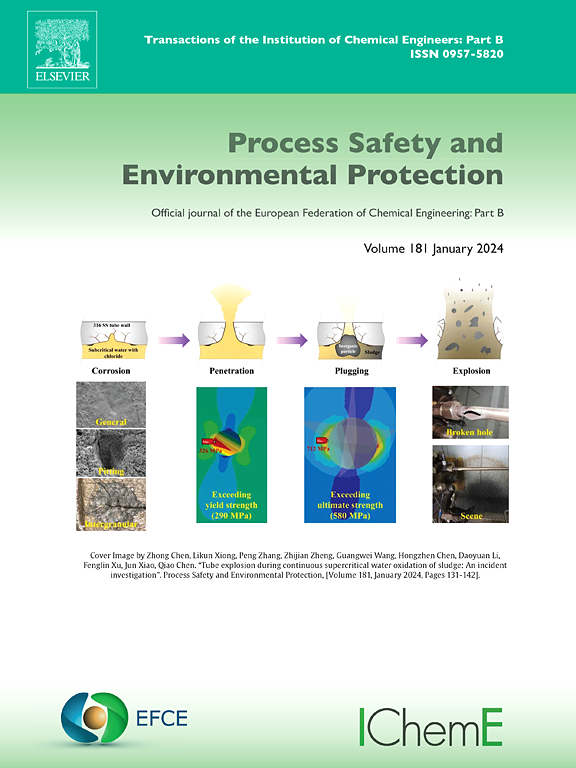Hydrogen sulphide inhibition in cattle slurry by use of an oxygen based slurry amendment
IF 6.9
2区 环境科学与生态学
Q1 ENGINEERING, CHEMICAL
引用次数: 0
Abstract
Hydrogen sulphide (H2S) is a malodorous gas that is produced in anaerobic environments where sulphur containing matter is present. Globally, farms in which liquid manure/slurry is stored is a source of H2S which can lead to many acute and chronic health problems and even death. Farming is one of the most dangerous professions globally and reducing the risk of sulphide poisoning on farms will help ensure a safer work environment. The inhibition of H2S production from cattle slurry may also reduce air pollution. In this study, a series of slurry storage experiments were conducted. The first experiment treated 20 L of cattle slurry bi-monthly using a mix of hydrogen peroxide and potassium iodide as well as calcium chloride, while the second experiment treated 660 L in which the same treatments and schedule were used. A small-scale storage trial was carried out over 29 days in which slurry was treated as before and sulphate concentrations were measured repeatedly. A maximum inhibition of H2S concentrations of 87 % and 81 % was recorded from the 20 L and the 660 L storage experiments, respectively. The treatment did not affect sulphate concentrations in slurry which are critical for plant growth.
使用基于氧气的泥浆改良剂抑制牛泥浆中的硫化氢
硫化氢(H2S)是一种恶臭气体,产生于存在含硫物质的厌氧环境中。在全球范围内,贮存液态粪便/泥浆的农场是 H2S 的来源之一,可导致许多急性和慢性健康问题,甚至死亡。农场是全球最危险的职业之一,降低农场硫化物中毒的风险将有助于确保更安全的工作环境。抑制牛粪中 H2S 的产生还可以减少空气污染。在这项研究中,进行了一系列泥浆储存实验。第一个实验使用过氧化氢、碘化钾和氯化钙的混合物每两个月处理 20 升牛泥浆,第二个实验处理 660 升牛泥浆,使用相同的处理方法和时间安排。进行了为期 29 天的小规模贮存试验,其中泥浆的处理方法与之前相同,并反复测量硫酸盐浓度。在 20 升和 660 升的储存实验中,对 H2S 浓度的最大抑制率分别为 87% 和 81%。这种处理方法不会影响泥浆中对植物生长至关重要的硫酸盐浓度。
本文章由计算机程序翻译,如有差异,请以英文原文为准。
求助全文
约1分钟内获得全文
求助全文
来源期刊

Process Safety and Environmental Protection
环境科学-工程:化工
CiteScore
11.40
自引率
15.40%
发文量
929
审稿时长
8.0 months
期刊介绍:
The Process Safety and Environmental Protection (PSEP) journal is a leading international publication that focuses on the publication of high-quality, original research papers in the field of engineering, specifically those related to the safety of industrial processes and environmental protection. The journal encourages submissions that present new developments in safety and environmental aspects, particularly those that show how research findings can be applied in process engineering design and practice.
PSEP is particularly interested in research that brings fresh perspectives to established engineering principles, identifies unsolved problems, or suggests directions for future research. The journal also values contributions that push the boundaries of traditional engineering and welcomes multidisciplinary papers.
PSEP's articles are abstracted and indexed by a range of databases and services, which helps to ensure that the journal's research is accessible and recognized in the academic and professional communities. These databases include ANTE, Chemical Abstracts, Chemical Hazards in Industry, Current Contents, Elsevier Engineering Information database, Pascal Francis, Web of Science, Scopus, Engineering Information Database EnCompass LIT (Elsevier), and INSPEC. This wide coverage facilitates the dissemination of the journal's content to a global audience interested in process safety and environmental engineering.
 求助内容:
求助内容: 应助结果提醒方式:
应助结果提醒方式:


